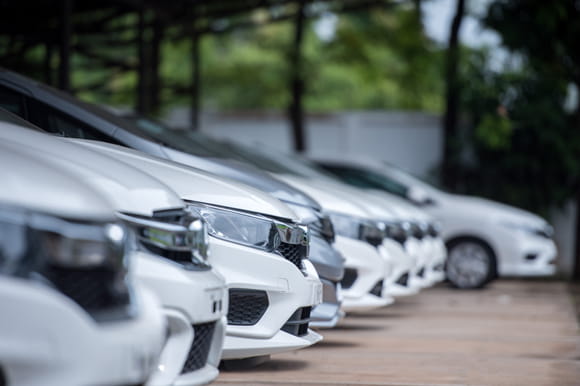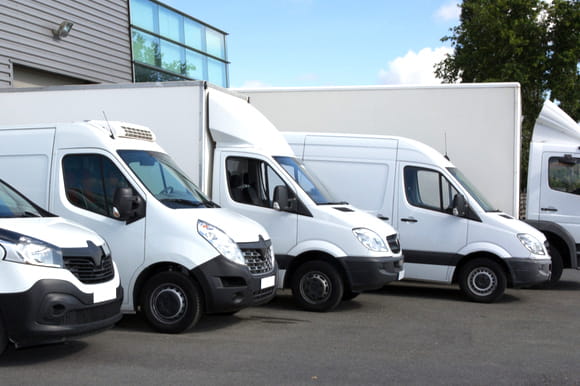Funding Options for Vehicles and Equipment in Your Small Business

Businesses, especially small businesses, tend to face a common dilemma. You need vehicles or equipment for your business to function and make money, but you may not have the money in the first place for all of the equipment you need. It’s a classic catch-22 situation.
Fortunately, this challenge is not impossible. Many financial institutions, including Citadel, provide financing options for business vehicles and equipment. Another option is to lease the vehicles or equipment instead, but which choice is best for your business? Let’s explore both options in order to highlight some of the most important considerations business owners should look at before making this decision.
What is a Business Equipment or Vehicle Loan?
A business equipment or vehicle loan is simply a loan given out for the purpose of a business purchasing equipment or vehicles. Much like how a mortgage is secured against the property itself, this kind of loan is also typically secured against whatever equipment or vehicle it is used to purchase.
Other than this, the details of these kinds of loans can vary widely, such as in terms of interest rates, loan size, necessary qualifications, and repayment length. For instance, Citadel offers loan terms of up to 84 months for business vehicles and 120 months for business equipment, with loan sizes of up to $100,000 for the former and $1,000,000 for the latter.
What About Leasing?
Leasing is basically like renting; you pay a monthly fee to the asset’s owner in exchange for being able to use it. There are generally also two types of leases: open-end and closed-end.
Open-End Lease
In an open-end lease agreement, also known as a finance lease, the lessee (your business) is obliged to make a lump-sum payment at the end of the lease period. The amount of this payment will be the difference between the residual value and fair market value of the asset. This is because the terms of this type of lease agreement includes how much the asset should be worth at the end of the lease period, and the payments are priced accordingly.
In other words, if the asset turns out to have depreciated more than anticipated by the lease agreement, you will have to bear the additional cost. Conversely, if it has depreciated less, it is possible to receive a refund on the payments that have been made. The important thing to know about this kind of lease is that you will be bearing depreciation risk. On the plus side, however, once you’ve paid that final sum, you will own the asset outright.
Closed-End Lease
In a closed-end lease, there is no obligation to purchase, meaning that you can truly walk away from the lease at the end of the stipulated period. That said, because the asset is returned to the owner at the end of the lease period, and they will want to protect the eventual value of the asset as much as possible, there may be additional restrictions on its use during the lease, such as maximum mileage stipulations in the case of vehicles. And while there is no obligation to purchase the asset at the end, most lessors also tend to offer incentives to the lessee to buy it.

Important Considerations When Considering a Loan vs. a Lease
Now that you’re aware of the differences between the two, which is better for your business? While we cannot make the decision for you, here are five questions to ask yourself that will help you make a choice.
Do I Qualify for a Loan?
Some financial institutions may have more stringent loan standards than others. If you are not eligible for a loan due to bad credit or some other issue, then leasing is your only option.
Can I Afford the Down Payment?
As a corollary to the first question, depending on your individual situation, the loan terms you are offered may require a certain down payment. Do note, however, that leases also tend to have upfront costs, usually a security deposit of some sort.
Do I Want to End Up Owning the Asset?
In many cases, you may want to own the asset eventually, in which case a loan or an open-end lease are preferable. By paying something off completely, you take financial pressure off the business, while still enjoying the use of the asset. And once you no longer need, you can sell it to recoup a significant portion of the original price. On the other hand, if it is the type of asset that may go obsolete quickly, then a closed-end lease may be a better option.
Are There Tax Advantages?
Generally, both purchased and leased vehicles or equipment offer possible tax deductions. The main difference is that in a purchase the tax is paid (and thus deductible) upfront, while in a lease the tax deductible will be spread out over the lease period.
How Will This Affect My Cash Flow?
Cash flow management is paramount to the survival of small businesses. It is also highly unique to each business. Therefore, it’s critical to consider how each option will affect your company’s future cash flow. Remember that both a lease and a purchase demands a fairly long-term commitment that could place pressure on cash flow if the business hits a slump.
For more advice and information, come down to your nearest Citadel branch and speak with one of our representatives. We’re here to help.
